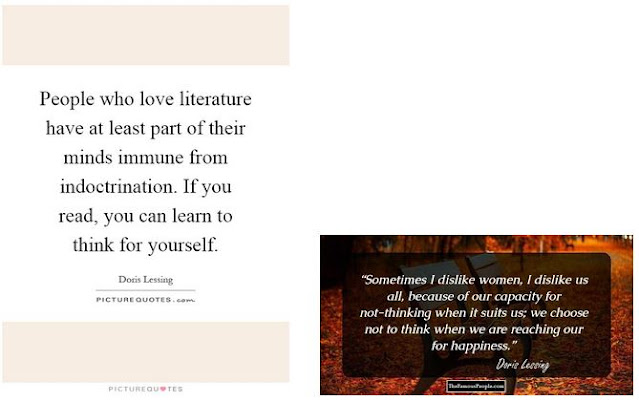Shared by Remedios Gómez:
Doris Lessing is one of my favourite writers in the whole world and I think her pieces of work must be required reading.
For you to know a little bit about
her life, I can tell you that although her parents were British, she was
born in Iran but she grew up in Southern Rhodesia (now Zimbabwe) and
spent her life there until she was 30 years old approximately.
Therefore, she is considered a British-Zimbabwean novelist. Her literary
work is mainly autobiographic because she was influenced by her
experiences in Zimbabwe, such as her strict education, her discovery of
nature or even her feelings about racial discrimination.
Doris Lessing was one of the rare authors to have won all the major literary prizes in Europe, for instance:
Somerset Maugham Award (1954)
Prix Médicis étranger (1976)
Austrian State Prize for European Literature (1981)
Shakespeare-Preis der Alfred Toepfer Stiftung F. V. S., Hamburg (1982)
WH Smith Literary Award (1986)
Palermo Prize (1987)
Premio Internazionale Mondello (1987)
Premio Grinzane Cavour (1989)
James Tait Black Memorial Prize for biography (1995)
Los Angeles Times Book Prize (1995)
Premi Internacional Catalunya (1999)
Order of the Companions of Honour (1999)
Companion of Literature of the Royal Society of Literature (2000)
David Cohen Prize (2001)
Premio Príncipe de Asturias (2001)
S.T. Dupont Golden PEN Award (2002)
Nobel Prize in Literature (2007)
Order of Mapungubwe: Category II Gold (2008)
I'd tell you about all her novels; for me it's almost impossible to select just one. But, let's have a look at these two:
1. The Grass is Singing
This was her first novel, and also the first piece of work that I read by Doris Lessing in my adolescence. It mainly deals with the racial politics between whites and blacks in Zimbabwe and I must confess the story grabbed me from the very beginning.
A curiosity about the title is that it is a phrase from T. S. Eliot's The Waste Land. You can listen to this wonderful poem here:
2. The Golden Notebook
Considered one of the 100 best English-language novels since 1923, it is a book that I deal with my advanced-level students coinciding with the celebration of Women's Day because one of the main themes covered by Lessing is women's liberation movements.
To finish this post, I'd like to share two famous quotes by Doris Lessing:







No hay comentarios:
Publicar un comentario